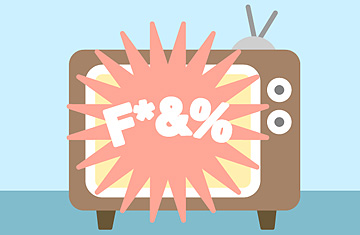
(2 of 4)
This cultural shift makes the debate over a handful of words on a handful of networks seem quaint. But it's an issue that is far from resolved — especially after last week's Supreme Court ruling.
On Thursday, the justices unanimously sided with Fox and ABC over profanity and nudity aired on a pair of live awards shows and a drama, saying that the commission did not give fair notice before the shows were broadcast that "fleeting expletives" and brief nudity were actionably indecent.
But the court's narrow ruling only raises more questions about what's acceptable and what isn't. To give the networks fair warning, it might be necessary to define indecency pretty specifically. And the justices completely sidestepped taking on the constitutionality of the FCC's indecency standards and even whether FCC enforcement itself is constitutional. All that makes things complicated for the family-friendly organizations trying to fight back against the slow erosion of decency standards on television.
"These big issues haven't been decided," says attorney John Crigler, who represents Pacifica, the foundation that operates WBAI. "It's inevitable that they will be, but just not today."
Instead, the justices inched a bit closer to what Carlin argued for in his monologue initially aired on the New York radio station — i.e. some entity would have to come up with a list of things considered vulgar. But of course vulgarity is often all about context, so creating a universally agreed upon list of all that is too unseemly could provoke another 40 years of arguing.
Seven Words
Those who worked at WBAI don't believe it was a coincidence that they were part of the first broadcast censorship case to make it to the Supreme Court. They believe they were targeted.
In the 1970s, WBAI was a beating heart for the American counterculture. Described as an "anarchist's circus" by The New York Times Magazine, the station vehemently protested the Vietnam War and was one of the first outlets to send a reporter to cover it first-hand. It championed gay rights long before it became a mainstream civil rights issue, and its programming was all things subterranean and avant-garde.
Paul Gorman was one of the station's producers and hosted a call-in show called Lunch Pail that aired from noon to 2 p.m. On October 30, the topic was words and how they were used, and Gorman felt that Carlin's monologue was a brilliant — and hilarious — exploration of the topic.
The decision to air Carlin's routine was solely Gorman's, but it affected the entire station. At the time, Larry Josephson worked at another affiliate owned by Pacifica, but he came on as an assistant manager the following year and wrote the eventual Supreme Court brief on behalf of the station.
"We were set up," Josephson says. "I think Morality in Media was looking to go after Pacifica and community stations that use this kind of language. Paul was having a serious discussion about language. He was trying to show that these words don't necessarily have anything to do with sex. S--t doesn't necessarily mean 'Take a s—t.' 'F--k you' doesn't always mean I want to have sexual intercourse with you. I don't know if they were so interested in a test case as they were just out to get us."
Many people have agreed with Josephson over the years. Why would Douglas, clearly not part of the counterculture, be listening to a radio station with which he strongly disagreed?
